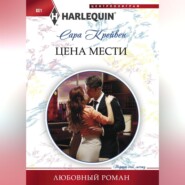По всем вопросам обращайтесь на: info@litportal.ru
(©) 2003-2024.
✖
Sara Craven Tribute Collection
Автор
Год написания книги
2018
Настройки чтения
Размер шрифта
Высота строк
Поля
She bit her lip. ‘Are you going to tell me what they are?’
‘Perhaps one day,’ he said, after a silence. ‘But not now. Not yet.’ He moved his shoulders briefly, almost irritably, as if shaking off some burden. ‘Do you wish to swim again, cara, or shall we go back to the house? Has that fool spoiled the afternoon for you?’
‘He’s spoiled nothing. And he’s gone. So I’d like to stay for a while—catch the last of the sun.’ Flora moved over to one of the sun loungers and lay down on it. As Marco stretched himself silently beside her she looked at him, aware of his air of preoccupation.
She said suddenly, ‘Marco, if you feel you should visit your godmother, then that’s fine with me. I’ll be perfectly happy to stay here.’
‘Do not concern yourself, carissima. I have more than fulfilled my obligations to her, believe me.’
He spoke quietly, but she could hear an underlying note of almost savage anger in his voice, and was shaken by it.
There were undercurrents here, she thought, staring sightlessly at the sky, that she could not begin to understand. But, then, her comprehension wasn’t required, she reminded herself with a pang. His other relationships were none of her business. Because she was here to share Marco’s bed, not his problems.
So she wouldn’t ask any more questions about Zia Paolina.
Nor would she permit herself to speculate about the unknown Ottavia, and her place in the scheme of things. After all, Marco had enjoyed a life before he met her, and that life would continue after she was gone. She couldn’t allow that to matter.
But then she remembered the satisfaction in Tonio’s voice when he’d pronounced the name—the gloating relish in his black eyes—and she knew that Ottavia could not be so easily dismissed.
She thought suddenly, Tonio’s the serpent that Marco warned me about—the serpent waiting for me here in paradise.
And found herself shivering, as if a dark cloud had covered the sun.
CHAPTER SEVEN (#ulink_997bdeb5-bc29-5449-bdf1-f04f2dc41f7b)
IT WASN’T really a cloud, Flora decided. It was more a faint shadow. Yet she was aware of it all the time.
It was there in the sunlit days, while she and Marco went to the beach, swam in the pool, played tennis, and explored the surrounding countryside.
While they dined by candlelight, or sat on the moonlit terrace, drinking wine and talking, or listening to music.
It was even there at nights, when he made love to her with such exquisite skill and passion, or soothed her to sleep in his arms.
And the time was long past when she could have said totally casually, Who is Ottavia?
To ask now would be to reveal that it was preying on her mind. That it had come to matter. And she couldn’t let him know that.
Because she had no right to concern herself. The parameters of their relationship were in place, and there was no space for jealousy.
There had been no more unwelcome visitors. In fact, no visitors at all. The real world was hardly allowed to intrude.
Flora was wryly aware how quickly she’d adapted to life at the castello, where unseen hands seemed to anticipate her every wish.
It was the quiet, impassive presence of Alfredo, she knew, that made San Silvestro run with such smooth efficiency. And, whatever his private views on her presence, he treated her invariably with soft-voiced respect.
Which was more than could always be said for Ninetta, Flora acknowledged frowningly. And it was just unfortunate that she had more to do with her than any of the other servants at the castello.
Not that the girl was overtly insolent, or lazy. There was just something—sometimes—in her manner which spoke of a buried resentment. The occasional suggestion of a flounce, and a faint curl of the full lips when Flora requested some service.
Not that it happened often. However much Marco might tease her about it, Flora could no more leave her clothes lying around for someone else to pick up, or abandon wet towels on the bathroom floor than she could fly. But sometimes she felt that Ninetta might have thought better of her if she’d done exactly that.
Or perhaps the girl was just tired of having to run round after yet another of the signore’s mistresses, she thought, with a stifled sigh. Although she could never ask her that, of course. Or whether Ottavia had ever been one of them…
She firmly closed off that line of questioning. She had to learn to live entirely for the present, she told herself. It was pointless concerning herself about the past, or even worrying over the future, because both were out of her hands.
So, it would be one day at a time, and no more, and what was the problem with that when she was so happy?
And no one, she thought, could ever take that away from her.
The boathouse, Flora had soon learned, was not just for show. It contained a speedboat, which Marco used mainly for water-skiing, as well as his windsurfer, and a sailing boat—the Beatrice II.
‘My father built the first one, and named it for my mother,’ he told Flora when he took her sailing the first time, standing behind her, steadying her hands on the wheel. ‘I decided to continue the tradition.’
‘Did she like to sail?’ Flora found she was revelling in this swoop along the coast, her ear already attuned to the slap of water against the bow and the song of the wind in the sails above her.
He shrugged. ‘My father loved to—and she loved to be with him. She even watched him play polo, which terrified her. And she was his first passenger when he got his pilot’s licence.’ There was a taut silence. ‘And, of course, his last.’
Flora was very still. Marco knew every detail of her family background, but up to now had said very little about his own. Perhaps this new candour would drive away the faint mist which seemed to hang between them.
‘There was an accident?’ Tentatively, she broke the brooding quiet.
‘Some kind of mechanical failure.’ His tone was brusque with remembered pain. ‘They were flying down here from Rome for my grandfather’s birthday. I had been allowed home from school for the occasion too, and I remember going with Nonno Giovanni to meet them at the airfield, whining because they were so late and I was getting bored.
‘And then someone came and called my grandfather away into another room. I could watch him through the glass partition, although I could not hear what was being said. But I saw his face—and I knew.’
‘How—how old were you?’ Flora asked, her heart twisting.
‘I was ten. Usually I flew with them too, and I had been angry because they had gone to Rome without me, to collect Nonno Giovanni’s birthday gift.’
He shook his head. ‘To this day I do not know what it was they had bought for him. But it could never have been worth the price they paid for it.’
She said quietly, ‘Marco—I’m so sorry. I—I had no idea, even though you’ve always talked about your grandfather rather than your parents. It must have been terrible for you.’
‘Yes,’ he agreed. ‘It was a bad time for us all. And I hardly had time to mourn before Nonno Giovanni began to train me as the next head of the family and the future chairman of Altimazza.’
She gasped. ‘But you were just a small child.’
‘The circumstances demanded that I grow up quickly,’ Marco said drily. ‘That I should understand and accept the responsibilities waiting for me.’
She leaned back against him. Her voice was husky. ‘And when you became a man, what if you’d decided that kind of life wasn’t for you?’
‘Ah, mia cara, that was never an option.’ He was silent for a moment. ‘Only once was I offered a choice—and then I chose wrongly.’ His voice was suddenly harsh.
She said hesitantly, ‘But now you’re free—surely?’
His arms tightened around her. She felt his mouth, gentle on the nape of her neck. ‘I want to believe that, mia bella. Dio—how much I want to believe it.’ There was a note almost of anguish in his tone.
He said no more, and she did not like to probe further.













